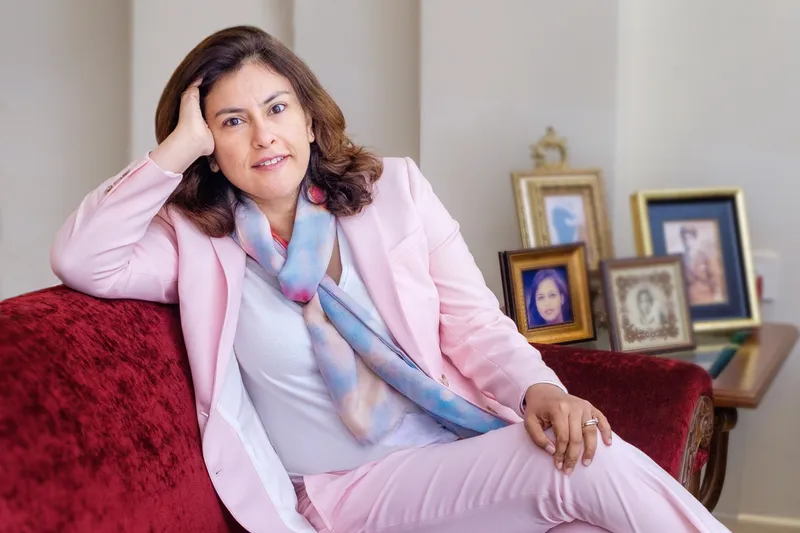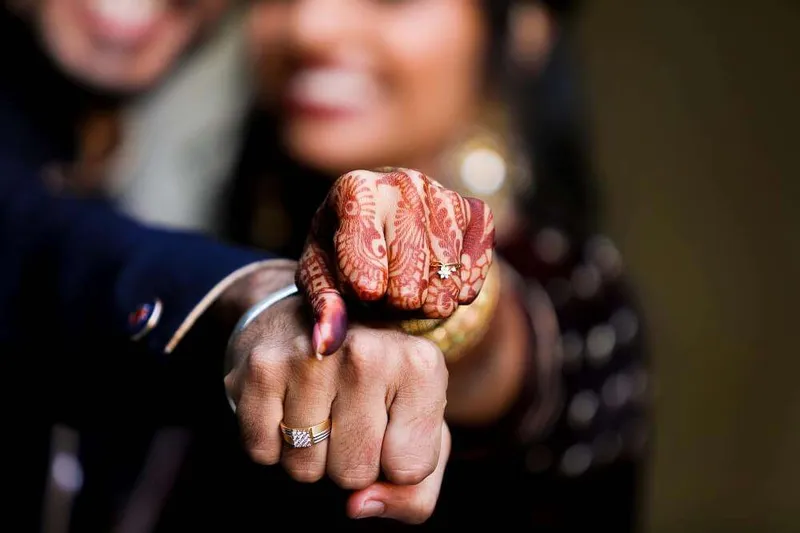From working with Arsenal FC to building a New York-based matrimony business for the elite, the story of Anuradha Gupta
In an exclusive interaction with YS Weekender, Anuradha Gupta of matrimonial service firm Vows for Eternity spills the beans of being a global matchmaker and how marriages have changed over the years.
Marriages are made in heaven. But it is the matchmaker who brings two individuals together.
Vows for Eternity is one such global, , and confidential matrimonial service firm founded by New York-based Anuradha Gupta. Ever since its inception 10-years ago, the company has been bringing together life-partners on the basis of mindsets, values, and personalities.
“It (Vows for Eternity) stemmed from a lot of introspection and empathy based on what I was seeing around me. It was more a gradual but paradigm shift. In a lot of ways, I wanted to not only make a difference by connecting people but also really encourage people to look within to understand themselves better because there is no such thing as the right partner -- it is the right partner for ‘a’ person. The person looking and the right person for them are like two sides of the same coin, they just have to be together. I see myself as a facilitator with a purpose deeper than just connecting two people,” Anuradha tells YS Weekender.

Anuradha Gupta, Founder of Vows for Eternity
Today, Vows for Eternity has members in over 65 countries, and offices in New York, London, Delhi, and Mumbai.
Prior to taking the entrepreneurial plunge, Anuradha worked with Arsenal FC for over six-years as a member of the football club’s strategy team.
Here are the edited excerpts from the interview:
YSWeekender: What were some of the fondest memories from your time with Arsenal FC?
Anuradha Gupta (AG): I was a part of the team when the club moved from the 100-year-old Highbury stadium to the new 65,000 capacity Arsenal Emirates Stadium. It was an exciting time. There were new partnerships that needed to be developed and new corporate offerings that needed to be put into place.
I first went to the new stadium wearing a hard hat as it was still a construction zone. Seeing it change from rubble to roar, it filled to capacity. To see it come alive with this pulsating energy was just unbelievable. Some things are tough to describe, one has to experience it, this was one of those times.
The respect that the team had for Arsene Wenger; seeing Thierry Henry play and the crowd go crazy; standing next to a very young Theo Walcott at the X-mas party as he joined the club; having coffee with Maradona; a conversation with Prince Phillip at the inauguration; meeting David Beckham and seeing just how down to earth he was, almost shy; seeing everyone come together with this incredible passion that bound them together – the sport, was just amazing. And of course, I learnt about football, which I knew nothing about!
I was told that I was the first non-footballer that the corporate team had hired in their 100-years history that the club had sponsored for a Visa.
YSW: What made you take up matchmaking as a profession? Who was your inspiration?
AG: My inspiration was life! If someone had asked me if I would be a matchmaker when I was in B-school, I would have thought they were crazy!
Matchmaking found me and not the other way round, and it stemmed from my personal journey of trying to find the right life-partner. I thought it was so tough to navigate through the plethora of avenues and yet none where I felt understood. The processes were so much about ticking certain boxes and I did not feel I fit in. I could not understand how I was meant to find that special person to spend my entire life with where there was so much emphasis given to things like colour, weight, and height - none of these things defined me.
Marriage is about being a good strong team and matchmaking should reflect that.

YSW: What is your approach when it comes to matchmaking?
AG: The reality is that there is no cookie-cutter solution because people are very different. Even when people have similar experiences, they evolve differently and sometimes even want different things from life.
I believe many things have to come together to make a partnership work. Physical attraction is an important part of marriage, but it is very important for two people to be aligned in their goals and values. And then there are a number of smaller subsets of individual journeys, family backgrounds, and childhood experiences, which really set the tone and foundation. One very important aspect of how we match-make is going through the process of determining what is truly important to a person and what is absolutely non-negotiable. This then decides the course and direction the search will take.
While matchmaking is not rocket science, it is as complex as it gets.
It has two individuals who have their own way of thinking at the heart of it. That is why I believe that people need to take time to get to know each other. While not all marriages have been love marriages, it is important that two people share a space which they can own and not be strangers. Having said that, at some level, marriage is a leap of faith. One can never know someone fully.
YSW: How do you shortlist candidates and how do you match them?
AG: Bringing individuals together based on personality, mindset, family values, and socio-economics are some of the parameters we feel make the best matches. Education is another, as is global exposure. We believe that these are the fundamentals people choose from when it comes to finding the right fit. I believe it is important for two people to be in love when they marry. It is for them to decide how long they want to spend in getting to know each other, we at VFE encourage that approach.

YSW: Who are your target audience?
AG: Our target audience is someone who is looking to truly share their beautiful life with another person, someone who wants to create that space between them where the magic happens! Of course, the baseline of being well educated, accomplished, progressive, and well brought up is a given.
YSW: How many candidates have you successfully matched so far?
AG: We have been around for about 10-years and have a 35 percent success rate (give or take), which is very significant given what we do. But I also believe that people have embraced us and helped us grow into being this global service because we are extremely bespoke.
YSW: How much do you charge for your services?
AG: We have various packages for our members to choose from. Our Anchor and Sail memberships are two-year subscriptions and start at Rs 3 lakh plus taxes in India. Our signature service, Privilege Suite, caters to a clientele looking for much more personalisation, discretion, and attention, and I am involved in meeting and matchmaking for each one of them.
YSW: What are the few challenges that you have faced as an entrepreneur?
AG: An entrepreneur's journey is always full of challenges and that is what makes it so exciting! I had an idea and believed in it enough to invest in it on every level.
On one hand, there is strategic planning, tactical operational structure, and on the other, there is the timing of when one aspect starts and the other should seamlessly take over. It is critical. It was very important to make sure that what I create is rooted in strong value systems, and at the same time is an extremely agile structure that can adapt very quickly, without losing its essence. That balance is very tough to achieve. The ability to fold up my sleeves and get the work done, the importance of building strong teams, and knowing that ultimately I am the captain of this ship for better or worse can sometimes test one’s mettle. Strength, willpower, resilience, immense hard work, fairness, and not to forget Karma, have been key for everything to come into play.

YSW: How has matchmaking evolved over the years?
AG: Today matchmaking has become significantly more complex essentially due to a few key reasons:
- There is this whole east-meets-west approach. In a lot of ways, it is highlighting the generational gap as parents often struggle to understand what children want and vice-versa. Earlier, the social pool was the same and parents were in their comfort zone. Now, children are travelling far and wide for the right education or career opportunities and parents are struggling with finding inroads in places where their children have moved to.
- A significant number of people are choosing to get married much later, which has its own pros and cons. On one hand, they get to experience life and discover themselves, on the other, people are more set in their ways and less adaptable, especially given the financial independence of women and the impact that brings to the mix.
- Stereotypical roles in a typical marriage do not resonate that much with the younger population. I also feel that women have taken giant strides forward as far as their education and career is concerned and in some ways the gap between men and women and what each considers as compromises and adjustments is wider than it was in past generations.
YSW: How are traditional Indian and NRIs mentality and concept of marriage different? What are the similarities?
AG: I do not believe that we are defined by where we choose to live. We are who we are independent of where we live. I have met NRIs and second generation Indian Americans who are more Indian than a lot of Indians living in India, and vice-versa. Our value systems define us irrespective of where we live and marriages are more about value systems than anything else. Our exposure, education, career choices, family background, dreams, aspirations all have a significant role and impact on who we turn out to be and the choices we make. Ultimately people want very similar things in a marriage -- wanting to love and be loved is at the heart of it. Respect, integrity, loyalty, friendship, and understanding are universal values that each person craves in their marriage.
YSW: What are the few things that a person looks for in their partner and how has that changed?
AG: I think in earlier generations, things were simpler. I do not mean better, but just simpler. Gender roles were very clearly defined and there was little movement to operate outside the realm of that structure, even if I am generalising.
Men were the breadwinners and women were the home-makers. Each person operated within those guidelines as their primary roles. What one was looking for in a life partner in terms of qualities was very much dictated by those drivers. It worked beautifully for a lot of people and for some it meant giving up on individual dreams because of family expectations.
Today, a lot has changed and women are looking at a much more level playing field. Women are as well educated, sometimes even more so, driven in their choices and do not make excuses for it and they also want a family. They have evolved to become significant contributors at various levels and wear multiple hats. But juggling different roles comes with its own set of complexities and is very challenging, it needs a certain level of maturity and self-confidence from both men and women. In that sense, the lines in gender roles have become relatively blurred...This, of course, then naturally lend itself to the fact that one is looking for more well-rounded individuals who can wear multiple hats -- be well educated, well-travelled, can mix well with each other's friends, families, and can collectively contribute to raising kids and home. It is a lot more about coming together as a team.
On the flip side, the beauty of Indian culture is that it is perfectly okay to be a full-time home-maker and focus on family, which is rare across other cultures.
Of course, one can never take away from physical attraction. Whether individuals meet organically or through a set-up, they look for chemistry and attraction, which is a given when individuals look for a spouse.
YSW: What is your definition of a perfect marriage?
AG: I do not think any marriage is perfect. I think marriage is about two imperfect, flawed people who really want to make it work by coming together because they love each other deeply.
Edited by Megha Reddy









